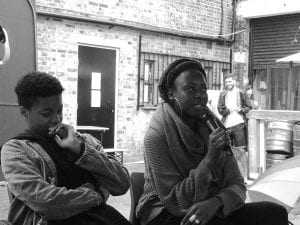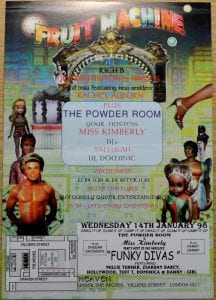What’s happening to London’s LGBTQI nightlife spaces?
By ucyow3c, on 15 September 2016
![]() Written by Laura Marshall, UCL Urban Laboratory Research Assistant and UCL Geography PhD student
Written by Laura Marshall, UCL Urban Laboratory Research Assistant and UCL Geography PhD student
Since May 2016, the UCL Urban Laboratory has been researching nightlife spaces in London significant to Lesbian, Gay, Bisexual, Trans, Queer and Intersex communities since 1986. Led by the centre’s Director Ben Campkin (UCL Bartlett School of Architecture) and PhD student Laura Marshall, the research has been prompted by the wide reporting and activism around the closure of commercial LGBTQI spaces, with a number of high-profile cases in the media, along with the election of Sadiq Khan as Mayor of London, who has renewed discussions of policy change to support culture, social integration and the night-time economy.
Following the success of Night Scenes – an Urban Lab-hosted workshop in July – we took the project to the first-ever Peckham Festival on 10 September, as part of the CAMP-er-VAN.

Tia Simon-Campbell and Olivia Mastin from Bbz speaking at Night Scenes @ CAMP-er-VAN © UCL Urban Laboratory]
The CAMP-er-VAN is the creation of designer, filmmaker and UCL Bartlett BSc Architecture graduate Samuel Douek.
In response to the number of London’s ‘queer spaces’ that have closed or whose futures are uncertain, Samuel sought to design and operate a ‘queer space’ immune from the threat of gentrification and oriented toward performance and community.
At the Peckham Festival, Night Scenes joined a line-up of performances – from burlesque to spoken word, film screenings to audience participation events.
Following a report on emerging findings from our archival and survey-based research, attention turned to a fantastic panel of Jeffrey Hinton, Mzz Kimberley and Tia Simon-Campbell and Olivia Mastin from Bbz.
Jeffrey is a legendary DJ, producer and visual artist who has be a key figure in London’s gay and queer nightlife since the 80s and continues to play at clubs such as Heaven and nights including Bootylicious.
Kimberley has been a highlight of gay and queer culture and cabaret scenes in London and beyond since the 90s and has performed in seminal venues including Madam Jojos, Heaven, The Royal Vauxhall Tavern, the Glory and the Arcola Theatre (to name a few).
Part art exhibition, part club night, Bbz is a relative newcomer to London’s LGBTQI scenes and was represented by founder, curator and photographer Tia Simon-Campbell and resident DJ Olivia Mastin.
It is based in south London and run by, and predominantly for, queer women and genderqueer people of colour – the significance of which should not be underestimated.
Along with nights and collectives such as The Batty Mama, Goldsnap and UNITI, Bbz form part of an emerging scene of more political and inclusive queer nightlife oriented towards communities who have, all too often, found themselves sidelined within London’s LGBTQI scenes.
The wealth of experience on London’s LGBTQI nightlife brought to the discussion by Jeffrey and Kimberley was invaluable. Both contributed poignant insights regarding recent closures of key venues and related the need for venues to keep up with and invest in supporting shifting cultures within LGBTQI scenes.
This point was supported by members of the audience during the Q&A. Kimberley and Jeffrey also reflected upon changes over time.
Notably, Mzz Kimberley discussed her pioneering role in fighting for hitherto male-only gay clubs to be accessible to people of all genders, and being the first trans woman of colour to perform within many LGBTQI nightlife spaces.

Fruit Machine at Heaven in 1998,
featuring Jeffrey Hinton and Mzz Kimberley
. Source: the LAGNA archive at the Bishopsgate Institute.
The panel agreed that the most exciting spaces on London’s nightlife scenes were those that are most inclusive and embrace a queer ethos and community focus.
Bbz is an excellent example of this approach, as was clear from Tia and Olivia’s comments, which emphasised the need for more community-oriented spaces for socialising.
A vital point raised by Olivia, and supported by the panel, highlighted the need for more inclusive daytime and night-time spaces across London created, owned, run by and for women, trans and non-binary folks, LGBTQI people of colour and others for whom the intersectional dimension of their identities often result in fewer socio-economic privileges than white, cis, middle-class men.
Overall, a clear message that emerged from the panel and audience at the CAMP-er-VAN is that, while it is important to support and protect LGBTQI heritage and spaces threatened with closure, in the current political and socio-economic climate, venues and communities cannot afford to be complacent.
While discussion and action around venue closures are vital, longstanding club nights and venues, as well as new spaces that are emerging, require support and demand recognition, especially those playing a vital role by addressing prevailing absences within London’s LGBTQI night scenes.
Keep up to date with our project by following us on Twitter, Facebook and on the LGBTQI nightlife spaces website.
 Close
Close


